

Lorem ipsum. Using lorem ipsum to focus attention on graphic elements in a webpage design proposal The lorem ipsum text is typically a mangled section of De finibus bonorum et malorum, a 1st-century BC Latin text by Cicero, with words altered, added, and removed that make it nonsensical, improper Latin.[1] Example text[edit]
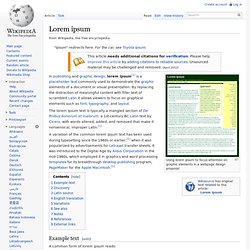
Paradise Lost. The poem concerns the Biblical story of the Fall of Man: the temptation of Adam and Eve by the fallen angel Satan and their expulsion from the Garden of Eden.
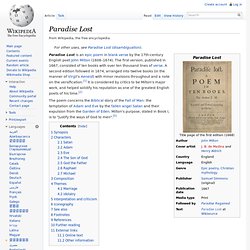
Milton's purpose, stated in Book I, is to "justify the ways of God to men".[5] Synopsis[edit] The poem is separated into twelve "books" or sections, the lengths of which vary greatly (the longest is Book IX, with 1,189 lines, and the shortest Book VII, with 640). Paradise Lost: Analysis of Major Characters. Satan Some readers consider Satan to be the hero, or protagonist, of the story, because he struggles to overcome his own doubts and weaknesses and accomplishes his goal of corrupting humankind.

This goal, however, is evil, and Adam and Eve are the moral heroes at the end of the story, as they help to begin humankind’s slow process of redemption and salvation. Satan is far from being the story’s object of admiration, as most heroes are. Nor does it make sense for readers to celebrate or emulate him, as they might with a true hero. Yet there are many compelling qualities to his character that make him intriguing to readers. One source of Satan’s fascination for us is that he is an extremely complex and subtle character. Milton devotes much of the poem’s early books to developing Satan’s character. Satan’s character—or our perception of his character—changes significantly from Book I to his final appearance in Book X.
Adam Adam’s greatest weakness is his love for Eve. Eve God. Devil in popular culture. Goethe's Faust. Johann Georg Faust. 17th-century German portrait of Faust.
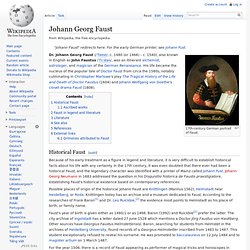
Historical Faust[edit] Because of his early treatment as a figure in legend and literature, it is very difficult to establish historical facts about his life with any certainty. In the 17th century, it was even doubted that there ever had been a historical Faust, and the legendary character was identified with a printer of Mainz called Johann Fust. Johann Georg Neumann in 1683 addressed the question in his Disquisitio historica de Fausto praestigiatore, establishing Faust's historical existence based on contemporary references. Faust. Faust is the protagonist of a classic German legend.
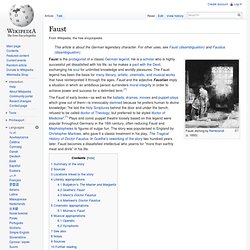
He is a scholar who is highly successful yet dissatisfied with his life, so he makes a pact with the Devil, exchanging his soul for unlimited knowledge and worldly pleasures. The Faust legend has been the basis for many literary, artistic, cinematic, and musical works that have reinterpreted it through the ages. Faust and the adjective Faustian imply a situation in which an ambitious person surrenders moral integrity in order to achieve power and success for a delimited term.[1] Jonathan Moulton. 'BrigadierGeneral Jonathan Moulton (July 21, 1726 – September 18, 1787) played an important role in the early history of New Hampshire and many tales of his adventures would become legendary.
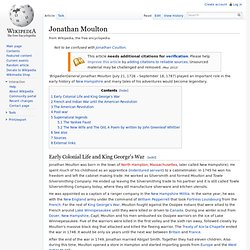
Early Colonial Life and King George's War[edit] Jonathan Moulton was born in the town of North Hampton, Massachusettes, later called New Hampshire). He spent much of his childhood as an apprentice (indentured servant) to a cabinetmaker. Theophilus of Adana. Saint Theophilus the Penitent or Theophilus of Adana (died ca. 538) was a cleric in the sixth century Church who is said to have made a deal with the Devil to gain an ecclesiastical position.
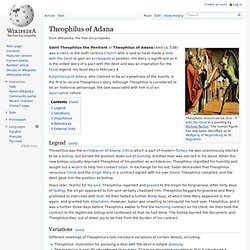
His story is significant as it is the oldest story of a pact with the devil and was an inspiration for the Faust legend. His feast day is February 4. Eutychianus of Adana, who claimed to be an eyewitness of the events, is the first to record Theophilus's story. Although Theophilus is considered to be an historical personage, the tale associated with him is of an apocryphal nature. Deal with the Devil. Written deal Overview[edit] The pact can be oral or written.
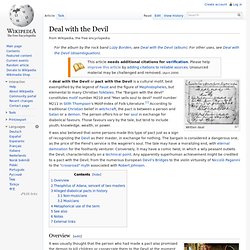
An oral pact is made by means of invocations, conjurations, or rituals to attract the demon; once the conjurer thinks the demon is present, he/she asks for the wanted favour and offers his/her soul in exchange, and no evidence is left of the pact; but according to some witch trials and inquisitions that were performed, even the oral pact left evidence, namely the diabolical mark, an indelible mark where the marked person had been touched by the Devil to seal the pact. The mark could be used as a proof to determine that the pact was made. It was also believed that on the spot where the mark was left, the marked person could feel no pain. File:UrbainPact2.jpg. Tommy Johnson (blues musician) Tommy Johnson (1896 – November 1, 1956) was an influential American delta blues musician, who recorded in the late 1920s, and was known for his eerie falsetto voice and intricate guitar playing.[1] He recorded two further sessions, in August 1928, and for Paramount Records in December 1929.
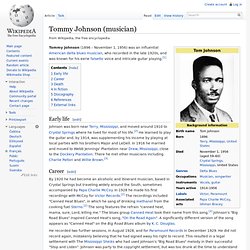
He did not record again, mistakenly believing that he had signed away his right to record. This resulted in a legal settlement with The Mississippi Sheiks who had used Johnson's "Big Road Blues" melody in their successful "Stop and Listen". Johnson was party to the copyright settlement, but was too drunk at the time to understand what he had signed to.[4] Robert Johnson. Johnson's records sold poorly during his lifetime.
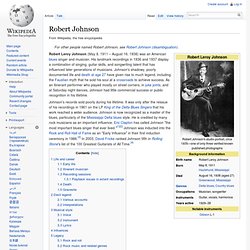
It was only after the reissue of his recordings in 1961 on the LP King of the Delta Blues Singers that his work reached a wider audience. Johnson is now recognized as a master of the blues, particularly of the Mississippi Delta blues style. He is credited by many rock musicians as an important influence; Eric Clapton has called Johnson "the most important blues singer that ever lived. "[1][2] Johnson was inducted into the Rock and Roll Hall of Fame as an "Early Influence" in their first induction ceremony in 1986.[3] In 2003, David Fricke ranked Johnson fifth in Rolling Stone′s list of the 100 Greatest Guitarists of All Time.[4] Life and career[edit] Early life[edit] Robert Johnson was born in Hazlehurst, Mississippi possibly on May 8, 1911,[5] to Julia Major Dodds (born October 1874) and Noah Johnson (born December 1884).
Circa 1919, Robert rejoined his mother in the Mississippi Delta area around Tunica and Robinsonville. Death[edit] Papa Legba. A younger depiction of the Vodou loa Papa Legba. Shown with his traditional keys, walking stick, and dogs at a crossroads. Legba figure in the Tropenmuseum in Amsterdam. This Legba figure is missing his knife or walking-stick.
He normally wears a hat and not horns. Apocrypha. Biblical canon. A biblical canon, or canon of scripture,[1] is a list of books considered to be authoritative scripture by a particular religious community. The word "canon" comes from the Greek "κανών", meaning "rule" or "measuring stick". The term was first coined in reference to scripture by Christians, but the idea is said to be Jewish.[2] The textual basis of the canon can also be specified. For example, the Hebrew/Aramaic text as vocalized and pointed (cf. niqqud) in the medieval era by the Masoretes, the Masoretic text, is the canonical text for Judaism. Most of the canons listed below are considered "closed" (i.e., books cannot be added or removed),[3] reflecting a belief that public revelation has ended and thus the inspired texts may be gathered into a complete and authoritative canon, which scholar Bruce Metzger defines as "an authoritative collection of books.
Killing the Buddha. An excerpt of this piece appears in our July 2009 "For 30 Years the Best of Buddhism in America: Commentary" retrospective. Here, we present the piece in its entirety. To see all of the complete "Best of" commentaries, click here.